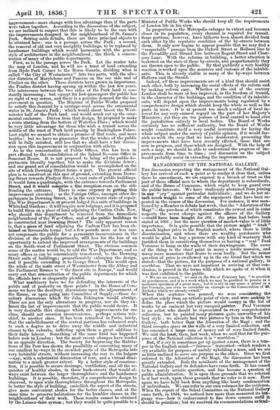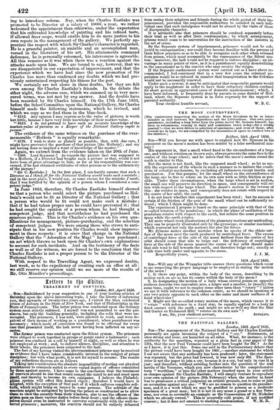MANAGEMENT OF THE NATIONAL GAIT:PRY.
THE discussion respecting the management of the National Gal- lery has arrived at such a point as to render it clear that, unless there be amendment, we are exposed to a breach of trust on the part of those official men to whom the department is subordinate, and of the House of Commons, which ought to keep guard over the public interests. We have studiously abstained from joining in any " cry " against particular individuals ; and we do not ate tech much weight to some of the arguments that have been re- peated in the course of the discussion. For instance, it was men- tioned by a Member in debate last week, that the " Adoration of the Magi"—the purchase of which constitutes the newest and in 801118 respects the worst charge against the officers of the Gallery -c-could have been bought for 501.; the price had before been stated at 100!.; but the mere question of market-value is of little importance. It is quite possible that the picture might "fetch" a much higher price in the English market, where there is little discrimination, and where there are wealthy purchasers who would be glad to buy a picture with any kind of warranty that justified them in considering themselves as having "real " Paul Veronese to hang on the walls of their drawingroom. The name of the thing is the chief point in many a lordly mansion, and many more mansions that desire to seem lordly. But the minor question of price is swallowed up in the one broad fact which we stated—that the picture, for the purposes of a national gallery, is worthless. That we were not impatient in arriving at that con- clusion, is proved in the terms with which we spoke of it when it was first exhibited to the public. "We see no reason," we said on the 9th of February last, "to question its genuineness, and it is a work which we may be gratified to possess as a moderate specimen of a great man ; but it is not in any sense a grand or a fine Veronese, nor even so covetable an example as the Consecration of et Nicholas which we already owned." When this sentence was penned, we were considering the question solely from an artistic point of view, and were seeking to define the place which the picture would occupy in the list of works by an eminent but very unequalakter. Paul Veronese is an artist who should be represented in every comprehensive collection, but he painted many pictures Ipite unworthy of his best style ; we already had two pictures by him in the National Gallery, both better than the Adoration of the Magi ; and the third occupies space on the walls of a very limited collection, and has consumed a large sum of money out of very limited funds. We said the least, then, last week, when we said that for the pur- poses of the National collection it is "worthless." But, if a cry is sometimes got up against a man, there is a tem- per in the English mind—" fairness" travestied—which renders a cry available for purposes of unduly upholding a man, and we are as little inclined to serve one purpose as the other. Since we first referred to the Adoration of the Magi, the discussion has been greatly extended. Both the assailants of the management of the National Gallery and its defenders have come forth. It has ceased to be a purely artistic question, and has become a question of public administration. It is upon these grounds that we referred to it last week, upon these grounds that we refer to it now. Hero again we have held back from anything like hasty condemnation of individuals. We can refer to our own volumes for the evidence. When the report of the Select Committee on the National Gallery' came forth, in 1854, we noticed how more than measured its lan- guage was—how it endeavoured to fine down censure until it should be pointless; but we received its recommendations astead- lag to introduce reform. Nay, when Sir Charles Eastlake was promoted to be Director at a salary of 1000/. a year, we rather welcomed the appointment than otherwise, under the expectation that his cultivated knowledge of painting and his refined taste, if allowed freer scope, would enable him to do more justice to his own repute in the management of the gallery. We perfectly ap- preciate the respect with which Sir Charles's character is regarded. Be is a graceful painter, an amiable and an accomplished man, versed in the literature of his art. His attainments command deference, he is personally esteemed, his intercourse is agreeable. All this remains as it was when there was a reaction against the attacks made upon him. We are bound to say, however, that we are disappointed in our expectation of improvement, and that the experience which we have had since the new promotion of Sir Charles has more than confirmed any doubts which we had pre- vimudy entertained respecting his fitness for the post.
We certainly are not alone in these doubts, for they are felt even among Sir Charles Eastlake's friends. In the debate the ether night, the adverse ease, which we summed up in very mea- sured terms, was not met by any answer. And the doubts have been recorded by Sir Charles himself. On the 17th June 1853, before the Select Committee upon the National Gallery, Sir Charles himself made the following statements, which he revised, and which we copy as we find them in the blue-book.
"6112. Any opinion I may express as to the value of pictures is worth but little, bemuse I have very little knowledge of their market-value. "6113. I do not pretend to have such an accurate knowledge-of the market-value of pictures as a Keeper of the National Gallery ought to possess."
The evidence of the same witness on the purchase of the ever- memorable " Holbein " is equally remarkable.
"6176. I wish to state .t,talasienly as possible, that, with due care, I
might have prevented the p of that picture [the Holbein] ; and my not having done so implied a want of knowledge of the master."
Again, we extract from the evidence taken on the 20th of June. "6388. Lord Seymour.] As regards the picture that was supposed to be a Holbein, if a Director had bought such a picture as that, would it not have been of great advantage to him, as far as his responsibility was con- cerned, if he had obtained certificates of other persons as to the authenticity of the picture ? "Sir C. 7,,astlake.) In the first place, I can hardly assume that such a Director as I thinhfit for the National Gallery would make such a mistake; and in the next place, I would say, as some excuse for the mistake I made, that I was fortified by the opinion of a person whom I considered a com- petent judge."
In June 1853, therefore, Sir Charles Eastlake himself showed us that a person who could select the picture purchased as Hol- bein's would not be fit as Director of the National Gallery ; that a person who would be fit could not make such a mistake ; that if he had taken proper care he could have preven.ted it ; that he had sought the opinion of a person whom he had thought a competent judge, and that nevertheless he had purchased the spurious picture. This is Sir Charles's evidence on his own qua- hfications for management, picture-purchasing, and the selection of competent judges. We were among those who strove to anti- cipate that in his new position Sir Charles would show improve- ment in these respects : it is since that change in the National Gallery that the "Adoration of the Magi" has been purchased; an act which throws us back upon Sir Charles's own. explanations to account for such incidents. And on the testimony of the facts as well as of the witness, we are forced to the conclusion that Sir Charles Eastlake is not a proper person to be the Director of the National Gallery. With respect to the Travelling Agent, we expressed doubts, last week, as to the expediency of creating such an office at all : we still reserve our opinion until we see more of the results of Mr. Otto Miindler's proceedings.



























 Previous page
Previous page